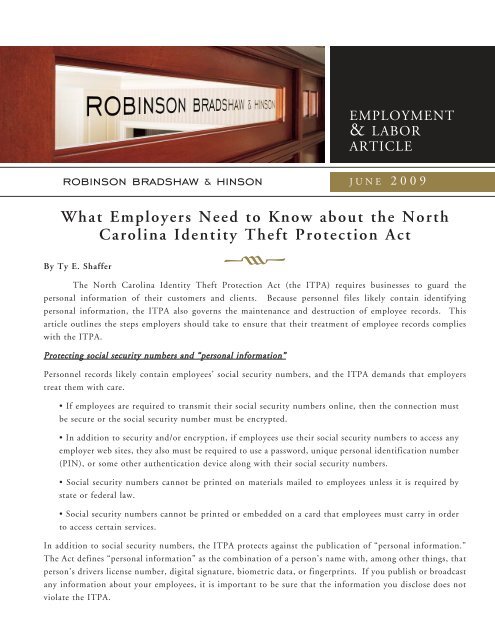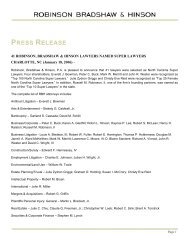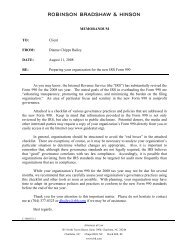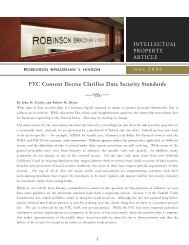Download PDF - Robinson, Bradshaw and Hinson
Download PDF - Robinson, Bradshaw and Hinson
Download PDF - Robinson, Bradshaw and Hinson
You also want an ePaper? Increase the reach of your titles
YUMPU automatically turns print PDFs into web optimized ePapers that Google loves.
EMPLOYMENT<br />
& LABOR<br />
ARTICLE<br />
JUNE 2009<br />
What Employers Need to Know about the North<br />
Carolina Identity Theft Protection Act<br />
k<br />
By Ty E. Shaffer<br />
The North Carolina Identity Theft Protection Act (the ITPA) requires businesses to guard the<br />
personal information of their customers <strong>and</strong> clients. Because personnel files likely contain identifying<br />
personal information, the ITPA also governs the maintenance <strong>and</strong> destruction of employee records. This<br />
article outlines the steps employers should take to ensure that their treatment of employee records complies<br />
with the ITPA.<br />
Protecting social security numbers <strong>and</strong> “personal information”<br />
Personnel records likely contain employees’ social security numbers, <strong>and</strong> the ITPA dem<strong>and</strong>s that employers<br />
treat them with care.<br />
• If employees are required to transmit their social security numbers online, then the connection must<br />
be secure or the social security number must be encrypted.<br />
• In addition to security <strong>and</strong>/or encryption, if employees use their social security numbers to access any<br />
employer web sites, they also must be required to use a password, unique personal identification number<br />
(PIN), or some other authentication device along with their social security numbers.<br />
• Social security numbers cannot be printed on materials mailed to employees unless it is required by<br />
state or federal law.<br />
• Social security numbers cannot be printed or embedded on a card that employees must carry in order<br />
to access certain services.<br />
In addition to social security numbers, the ITPA protects against the publication of “personal information.”<br />
The Act defines “personal information” as the combination of a person’s name with, among other things, that<br />
person’s drivers license number, digital signature, biometric data, or fingerprints. If you publish or broadcast<br />
any information about your employees, it is important to be sure that the information you disclose does not<br />
violate the ITPA.
Destroying personnel records<br />
The obligation to protect personal information extends to taking reasonable measures to guard against<br />
unauthorized access to or use of that information after its disposal. These measures include the destruction<br />
of employee records (whether in paper or electronic form) such that personal information cannot be read or<br />
reconstructed. In addition, employers must maintain “as official policy in the writings of the business entity”<br />
a description of their policies <strong>and</strong> procedures relating to the proper disposal of personnel records in<br />
compliance with the ITPA.<br />
The ITPA does authorize businesses to enter into contracts with document destruction specialists, but only<br />
“after due diligence.” This due diligence must include one or more of the following actions:<br />
• Reviewing an independent audit of the disposal business’ compliance with the ITPA or of its business<br />
operations;<br />
• Consulting references or other reliable sources <strong>and</strong> requiring that the disposal business be certified by<br />
a recognized trade association, such as the National Association for Information Destruction (“NAID”),<br />
or other entity that provides such certification; or<br />
• Reviewing <strong>and</strong> evaluating the disposal business’ information security policies <strong>and</strong> procedures, or<br />
taking other steps to determine the competence <strong>and</strong> integrity of the disposal business.<br />
Dealing with security breaches<br />
In addition to the general requirement that businesses make reasonable efforts to protect against a security<br />
breach, the ITPA requires businesses to take affirmative steps to notify employees whose personal information<br />
is at risk. Specifically, “immediately following the discovery of the breach,” an employer must give employees<br />
a “clear <strong>and</strong> conspicuous” notice containing the following information:<br />
• A description of the incident in general terms;<br />
• The type of personal information that may have been accessed;<br />
• A general description of the actions that the employer is taking to protect employees’ personal<br />
information from further unauthorized access;<br />
• A telephone number that employees may call for more information <strong>and</strong> assistance; <strong>and</strong><br />
• A statement advising employees to remain vigilant by reviewing their account statements <strong>and</strong><br />
consulting free credit reports.<br />
Consequences of noncompliance<br />
The costs of violating the ITPA may be significant. For example, an employer could face a civil action in<br />
which damages will be tripled. In addition, the court may award a successful plaintiff its attorney’s fees. The<br />
Attorney General also is empowered to institute a suit against a violating party, <strong>and</strong> the court may impose a<br />
civil penalty of $5,000 for each violation of the ITPA.<br />
What steps should employers take to ensure compliance<br />
• Review your recordkeeping practices. Now is the time to be sure that your recordkeeping practices<br />
comply with the ITPA. For example, any paper copies of personnel records should be kept in a secure<br />
area, <strong>and</strong> employers should have a set procedure for review of employee records to ensure that there is<br />
2
no unauthorized access. Employers also should take this opportunity to ensure that their treatment of<br />
employee social security numbers does not violate the ITPA. In addition, if you currently use a<br />
document destruction service, find out if it is accredited by the NAID <strong>and</strong> ask about the steps it takes<br />
to guarantee compliance with the ITPA.<br />
• Create <strong>and</strong> implement a written recordkeeping policy. By developing practices that comply with the<br />
ITPA, employers can reduce the risk that personal information will be disclosed or otherwise misused.<br />
The ITPA requires employers to adopt a written policy for the destruction of confidential records. But<br />
a written records management policy also should describe procedures for accessing <strong>and</strong> protecting<br />
personnel records, as well as procedures for responding to any security breaches.<br />
• Periodically test the security of electronic records. Because electronic records are popular targets for<br />
identity theft, employers must be sure that these records are secure from unauthorized access. Regular<br />
testing of the security of systems <strong>and</strong> electronic records will help to prevent security breaches.<br />
• Educate your employees. Employers should ensure that those employees responsible for maintaining<br />
(<strong>and</strong> destroying) personnel records underst<strong>and</strong> their obligations under the ITPA.<br />
The threat of identity theft means we must be increasingly careful in the ways we use information about<br />
ourselves <strong>and</strong> others. Both individuals <strong>and</strong> business have a role to play in ensuring that personal information<br />
remains confidential. The requirements that the ITPA imposes on businesses are common to an array of state<br />
statutory schemes designed to protect citizens from identity theft. Because North Carolina’s ITPA has<br />
counterparts in other states, multi-state employers must be mindful of the dem<strong>and</strong>s imposed by the laws of<br />
other states where they operate.<br />
<strong>Robinson</strong>, <strong>Bradshaw</strong> & <strong>Hinson</strong>, P.A. is a corporate <strong>and</strong> commercial law firm with more than 125 attorneys. The firm has offices in<br />
Charlotte <strong>and</strong> Chapel Hill, North Carolina, <strong>and</strong> Rock Hill, South Carolina. For over forty years, the firm has consistently provided<br />
innovative solutions to its clients’ business needs from both a legal <strong>and</strong> practical perspective. The firm serves as counsel to public <strong>and</strong><br />
closely held corporations operating in domestic <strong>and</strong> foreign markets; limited liability companies; limited <strong>and</strong> general partnerships;<br />
individuals; municipal, county <strong>and</strong> state agencies; public utilities; health care institutions; financial institutions <strong>and</strong> tax-exempt<br />
organizations. For more information on <strong>Robinson</strong>, <strong>Bradshaw</strong> & <strong>Hinson</strong>, please visit our Web site at www.rbh.com.





